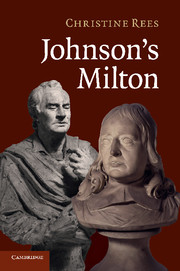Book contents
- Frontmatter
- Contents
- Acknowledgements
- List of abbreviations
- Introduction: Johnson and Milton
- PART I JOHNSON THE READER/WRITER: APPROPRIATING MILTON'S TEXTS
- PART II JOHNSON THE CRITIC: ASSESSING MILTON'S ACHIEVEMENT
- 5 ‘Phantoms which cannot be wounded’: the Lauder affair
- 6 Cutting a Colossus: Johnson's criticism of Paradise Lost
- 7 Cherry-stones: Johnson on Milton's shorter poems
- PART III JOHNSON THE BIOGRAPHER: CONSTRUCTING MILTON'S CHARACTER
- Notes
- Select bibliography
- Index
7 - Cherry-stones: Johnson on Milton's shorter poems
Published online by Cambridge University Press: 05 October 2010
- Frontmatter
- Contents
- Acknowledgements
- List of abbreviations
- Introduction: Johnson and Milton
- PART I JOHNSON THE READER/WRITER: APPROPRIATING MILTON'S TEXTS
- PART II JOHNSON THE CRITIC: ASSESSING MILTON'S ACHIEVEMENT
- 5 ‘Phantoms which cannot be wounded’: the Lauder affair
- 6 Cutting a Colossus: Johnson's criticism of Paradise Lost
- 7 Cherry-stones: Johnson on Milton's shorter poems
- PART III JOHNSON THE BIOGRAPHER: CONSTRUCTING MILTON'S CHARACTER
- Notes
- Select bibliography
- Index
Summary
If Johnson's problems with Paradise Lost have their source in Milton's choice of subject rather than his choice of form, almost the reverse is true of his response to the shorter poems. Milton's reinvention of genres throughout his literary career is a critical commonplace; most writers on Johnson's criticism agree that his attitude to genre is unaccommodating, and that he sees little scope for revitalising a number of the traditional kinds. What is more, in Lives of the Poets, he delivers judgements with the authority of long experience, an old critic writing about poetry that is often the poetry of young men. The biographical format means that he has to survey the entire trajectory of each writer's career, measuring minor poems against major, juvenilia against mature achievement. To read through all the Lives is to grow increasingly aware of these evaluative categories.
Although Johnson can be generous to youthful ambition – ‘incitements to early excellence are never superfluous’ (Lives IV. p. 94) – he takes it for granted that most writers improve with maturity, that as with any other craft an apprenticeship has to be served. Dovetailing with this assumption is another, that short poems are often little in more senses than one, intellectually lightweight however attractive aesthetically: ‘what is little can be but pretty, and by claiming dignity becomes ridiculous’ (Lives I. p. 220).
- Type
- Chapter
- Information
- Johnson's Milton , pp. 150 - 188Publisher: Cambridge University PressPrint publication year: 2010



